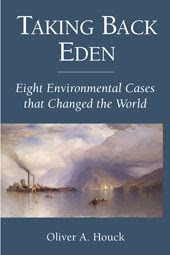Acting sua sponte, the U.S. Court of Appeals for the D.C. Circuit announced on May 16 that it will hear the legal challenges to EPA’s Clean Power Plan en banc. The court rescheduled the date for oral argument from June 2 to September 27. Thus, instead of being heard initially by a three-judge panel, the case will be heard by the entire court. However, due to Judge Merrick Garland’s nomination to the U.S. Supreme Court, he will not be among the judges hearing the case. Judge Nina Pillard also did not participate in the decision to take the case en banc, making it likely that the en banc court hearing the case will consist of only nine of the 11 judges on the court. The delay in the oral argument means that the court’s decision is not likely to be issued until after the presidential election. But it ultimately may slightly accelerate Supreme Court review by eliminating efforts to get any panel decision reheard en banc. With the two recusals, five of the nine remaining judges hearing the case were appointed by Democratic presidents and are believed by most observers to be favorably disposed to EPA.
On May 16 the U.S. Supreme Court refused ExxonMobil’s request to review a New Hampshire Supreme Court decision upholding a $236 million judgment against the company for contaminating groundwater supplies with the gasoline additive methyl tertiary butyl ether (MTBE). The state of New Hampshire had sued 16 oil companies in 2003. Fifteen of them settled, but Exxon went to trial. Exxon argued that its due process rights were violated by the use of market share liability to estimate its share of the contamination and that any liability should be preempted by the federal Clean Air Act directive to oxygenate gasoline.
From May 23-27, the second session of the United Nations Environment Assembly (UNEA-2) was held in Nairobi under the sponsorship of the UN Environment Programme (UNEP). The theme of the assembly was “Delivering on the Environmental Dimension of the 2030 Agenda for Sustainable Development.” All 193 member states of the UN are members of UNEA, which has been described as a “Parliament of the Environment.” UNEA, which sets UNEP’s agenda, was established as part of an effort to strengthen UNEP, a decision made at the UN’s “Rio+20” Earth Summit in 2012. The first session of the assembly was held in 2014. Twenty-five resolutions were adopted at UNEA-2, addressing issues such as marine litter, the illegal trade in wildlife, air pollution, chemicals and waste, and sustainable consumption and production - which are an integral part of the global action needed to implement the 2030 Agenda for Sustainable Development and the Paris Climate Agreement. A complete set of the resolutions will be posted online at: http://web.unep.org/unea
From May 23-28 the World Health Organization held its 69th World Health Assembly in Geneva, Switzerland. The World Health Assembly, comprised of WHO’s members is the organization’s decision-making body. Delegates agreed to a comprehensive series of steps to pursue the health-related Sustainable Development Goals. They also adopted the WHO Framework of Engagement with Non-State Actors (FENSA), which establishes “comprehensive policies and procedures on engaging with nongovernmental organizations, private sector entities, philanthropic foundations and academic institutions.” The Framework is designed to enhance transparency and accountability in WHO’s engagement with non-State actors and to protect WHO’s work from conflicts of interest and undue influence from external actors.
On May 24, the U.S. House of Representatives voted 403-12 to approve the Frank R. Lautenberg Chemical Safety for the Twenty-first Century Act. The legislation reconciles different versions of legislation passed by each house last year that would comprehensively reform the Toxic Substances Control Act (TSCA). The legislation gives EPA greater authority to require chemical testing and otherwise strengthens the 40-year old TSCA. A description of its provisions is available at: http://blogs.edf.org/health/files/2016/05/Major-features-of-FRL21-5-23-16.pdf. It was widely anticipated that the Senate would also approve the legislation on May 26, sending it to President Obama for his signature, but a last-minute hold by Senator Rand Paul prevented Senate passage before Congress adjourned for the Memorial Day recess.
On Friday May 20, the University of Maryland Carey School of Law held its commencement exercises. Secretary of Labor Tom Perez gave a great graduation address where he praised Maryland’s Environmental Law Program. A total of 14 graduating students received their certificates of concentration in environmental law. On May 25 I was the guest speaker for a Global Youth/Health Forum webinar on “The Role of Civil Society in Reducing Air Pollution and Ensuring a Healthier World,” co-sponsored by co-sponsored by the Millenium Campus Network and Youth Action.

















No comments:
Post a Comment